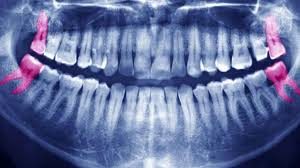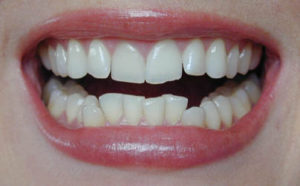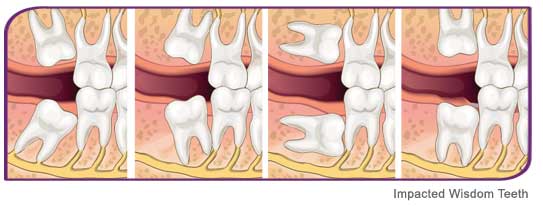Wisdom teeth are a dental issue most people have to deal, which can prove to be problematic and daunting. Understanding wisdom teeth and common issues associated with them is the best thing you can do while you wait to find out about your own wisdom teeth situation.
What are wisdom teeth?
 Firstly, we should start by discussing what these mysterious and elusive teeth actually are. They are not just a warning from our parents, “wait until you’re old enough to get your wisdom teeth, then you’ll know toothache!” Wisdom teeth are the rear molars that only come through when a person is in their late teens/early twenties. Although, some lucky people don’t have wisdom teeth at all!
Firstly, we should start by discussing what these mysterious and elusive teeth actually are. They are not just a warning from our parents, “wait until you’re old enough to get your wisdom teeth, then you’ll know toothache!” Wisdom teeth are the rear molars that only come through when a person is in their late teens/early twenties. Although, some lucky people don’t have wisdom teeth at all!
What to expect with wisdom teeth?
Most people have four wisdom teeth, two on the bottom and two on the top jaw. However, people can have any number from one to four of wisdom teeth. When wisdom teeth are emerging, you have some pain to look forward to, along with the possibility that you’ll need them removed. Wisdom teeth are known to cause various dental issues, such as overcrowding of existing teeth and are often ‘impacted’. If you’ve had braces, you are much more likely to have them removed. This is regardless of whether they are predicted to cause problems or not, as who would want to wreck that pretty (and expensive) smile.
What is overcrowding?
 This is a self-explanatory dental issue that can be a direct result of wisdom teeth coming through. Overcrowding of existing teeth means that there isn’t enough room in the mouth for more teeth to come through. If there isn’t enough room and new teeth emerge regardless, dental issues such as teeth misalignment is a likely outcome (which is not ideal, especially if you’ve had braces!). If there is overcrowding, teeth will have to be removed or the space between teeth will have to be surgically narrowed (this sounds scary). Basically, overcrowding is not desirable and will cause more dental issues in the long run. However, overcrowding is a common occurrence if wisdom teeth are allowed to come through without a dental assessment.
This is a self-explanatory dental issue that can be a direct result of wisdom teeth coming through. Overcrowding of existing teeth means that there isn’t enough room in the mouth for more teeth to come through. If there isn’t enough room and new teeth emerge regardless, dental issues such as teeth misalignment is a likely outcome (which is not ideal, especially if you’ve had braces!). If there is overcrowding, teeth will have to be removed or the space between teeth will have to be surgically narrowed (this sounds scary). Basically, overcrowding is not desirable and will cause more dental issues in the long run. However, overcrowding is a common occurrence if wisdom teeth are allowed to come through without a dental assessment.
What does ‘impacted wisdom teeth’ actually mean?
This terminology haunts a lot of people. This is what dentists and/or mouth surgeons mention to justify and explain why removing your wisdom teeth is necessary. Impacted wisdom teeth is the term given to wisdom teeth when there is a problem preventing them from emerging or developing properly. Problems that can cause impacted wisdom teeth include: not having enough space in the mouth to come through, wisdom teeth emerging at wrong angles (misaligned or growing into another tooth) and wisdom teeth growing in the direction of the jaw nerve.
Wisdom teeth warning signs
Wisdom teeth have a couple of warning signs you should be looking out for.
- Jaw pain. This is the most common warning sign. The severity varies greatly between people. The luckier people experience only a dull niggling pain on occasion. Whilst, the less fortunate experience shooting pain up their jaw (especially when they eat).
- Swollen glands. Otherwise known as “swollen lymph nodes” by medical professionals. When your doctor lightly feels your neck when you are sick, they are checking whether your glands are swollen. If they are, it is a sign your body is fighting an infection or an illness, which results in inflammation in that area.
- Gum issues. There are two common gum related warning signs for wisdom teeth. Swollen gums and bleeding gums, which will usually happen in the back of your mouth (in the wisdom teeth area).
What should I do?
The first thing to do if you notice any warning signs is to book an appointment with your dentist. Your dentist will be able to examine your mouth, take an x-ray and provide advice about what to do next. Wisdom teeth are not something to fear. However, understanding more about them and what to expect is the best thing you can do while you wait.

